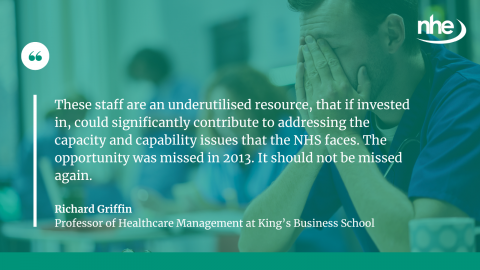A new report from King’s College London has suggested that NHS support staff still feel undervalued and invisible 10 years after the Cavendish Review.
The review, which was conducted in 2013 by Camilla Cavendish as part of the fallout from the Francis Inquiry into Mid Staffordshire NHS Foundation Trust, concluded that in all discussions around the values, standards and quality of care in the NHS and social care sector, the support workforce received the least attention and were largely “invisible”.
As part of the report — titled The Cavendish Review Ten Years On: Are NHS support workers still ’invisible’? — more than 5,200 clinical support staff completed a survey, which showed that a decade later:
- only a fifth (20%) felt the NHS valued support workers;
- a little over one in two (53%) would recommend becoming a support worker to a friend or family member;
- more than a quarter (28%) frequently think about quitting their job;
- a quarter (26%) felt their ‘pay banding’ or grade was fair;
- just one in four (27%) thought support staff were not “invisible”; and
- one in five (21%) believed they were not able to share their views at work.
Ultimately, this latest report widened its scope to all patient-facing support workers across the NHS in England and found many of same issues remain around recruitment, management and career development.
“Clinical support workers are crucial to the NHS, often spending more time than doctors and nurses with patients and their families, so it is hugely disappointing to find they still feel invisible and undervalued,” said Richard Griffin, healthcare management professor at King’s Business School.
Prof Griffin, who was one of the report’s lead authors, added: “These staff are an underutilised resource, that if invested in, could significantly contribute to addressing the capacity and capability issues that the NHS faces. The opportunity was missed in 2013. It should not be missed again.”
Cavendish, who is a member of the House of Lords, described the findings as “frustrating”.

The report puts forward a number of recommendations, including organising a national stakeholder summit as soon as possible to build a policy agenda for the recruitment, training, development, deployment, and management of support workers in health and care.
Senior leaders at all organisational levels of the NHS — including trust boards and integrated care boards — should be identified and given responsibility for support staff recruitment, deployment and development is another recommendation.
It also suggested that the Care Quality Commission should consider training, development, voice, and management of all staff, including support staff, in their inspections, and report back in a dedicated section in all inspection reports.
It is estimated clinical support staff make up 28% of the overall health service workforce and work alongside nurses, midwives, physiotherapists, radiographers, orthoptists and others.
General secretary at UNISON, Christina McAnea, said: “The NHS would simply collapse without the hundreds of thousands of its unsung workers who give vital care. It’s clear their contribution still goes unrecognised.
“Many aren’t paid fairly for the duties they perform, often way beyond their wage band. Ensuring staff are properly valued is key to solving the workforce crisis.”
Image credit: iStock



















